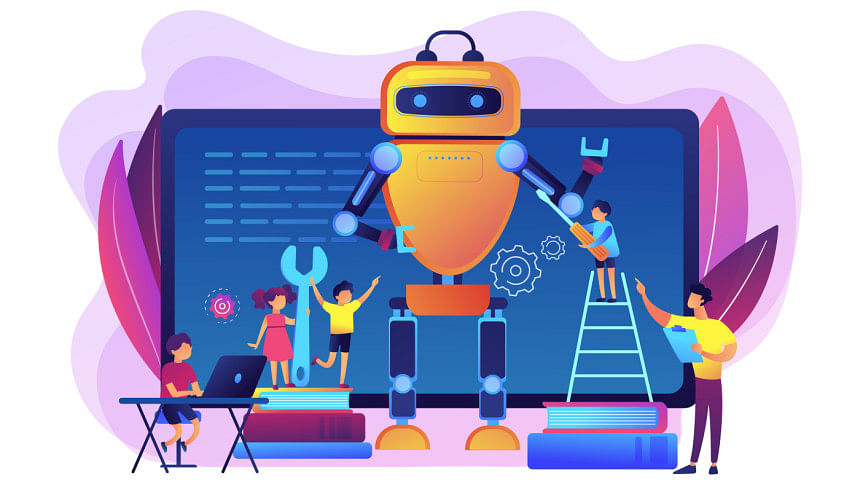Education in a world of AI

"Don't use Google"—that was the warning in our time. When the internet was just beginning to spread its wings, teachers feared this new tool would lure us away from books and "real" learning. Ours was perhaps the last generation to straddle two eras: the analogue world of TV guides in newspapers and the digital age of streaming and smartphones.
Today, the fear isn't about Google anymore. It's about AI, digital classrooms, and how technology is reshaping education. What is the future of learning in a world where AI evolves rapidly and knowledge is freely available online? Can digital education replace classrooms, or should it only support them?
When it comes to education, we need clear guidelines to navigate these uncharted waters. Tools like ChatGPT offer possibilities, but we must decide how—and how much—to rely on them. Especially for children, we must distinguish what helps from what could harm. For students' sake, we must learn how to control technology, not let it control us.
For countries like ours, the digital divide is real. It's never just about buying tablets for online classes. We must think about every child—the one in a remote village, in a slum, and in a Dhaka apartment. If we are serious about equity, we must ask: is this the time to prioritise digital education? Is EdTech truly the best solution to deepening educational inequality?
The truth is, we don't know yet. But we must not ignore the reality of AI and EdTech entering our teaching-learning spaces. Students will use AI; teachers will, too. How do we ensure that we become more productive, creative, and efficient with AI, rather than lazier, more corrupt, and quick to cut corners?
Soon, every educational institution will need AI experts, just as they need mental health professionals. We must consider AI training to inform us of the pros and cons in our educational and daily lives. We also need to listen to scholars studying AI and EdTech—like the stimulating work being done by Global South researchers on what it means to decolonise our thinking and perceptions in the age of AI, with all its embedded biases.
Let's be honest. AI does hold potential—if used wisely. One powerful promise of AI is its ability to level the playing field. In a deeply unequal society, AI tools can offer students from less privileged backgrounds access to explanations, resources, and support they wouldn't otherwise get. A student in a rural school can now ask questions, practise problems, and receive feedback—all for free. AI won't erase inequality, but it can offer opportunity based on curiosity and ability, not just privilege.
Still, we must brace ourselves. AI in the hands of someone unable to think critically is like handing a sharp knife to an unknowing child. And teaching someone to think critically isn't just about teaching someone new tricks—it's about helping them lead more meaningful lives.
The reality is that education is more than content delivery. A strong system must also be engaging. The popularity of digital platforms among students reflects real gaps in our traditional classrooms: gaps in excitement, motivation, and relevance. Until students enjoy learning and want to go to school—not just have to—we can't blame them for turning to the internet for what schools fail to provide. Yet, no matter how good online material is, education is more than learning facts. A classroom offers discussion, debate, and interaction, not just with teachers but with peers. A 10-minute video might teach you something. But it's not the same as being in a classroom.
With AI already popular and accessible, it's time to stop being in denial and accept that it's naive to say, "Don't use AI" and expect to be obeyed. If we embrace AI wisely—with rules, access, equity, and intention—we can harness its strengths without losing the essence of what education really is. In this new world, our challenge is not to resist change, but to shape it. To ask the right questions. To pause before we leap. To make sure that, in fixing education, we don't forget its purpose. Let's not forget that education is not just about what we learn; it's also about how we learn, whom we learn with, and the journey it takes us on.
The key is to stay critical and vigilant, but also realistic. We couldn't stop the internet from taking over our lives, and we won't stop AI either. The challenge is to figure out how to co-exist—and how to use these new tools for better, not worse. Learning where to draw the line remains the greatest lesson.
Dr Rubaiya Murshed is an education economist and assistant professor in the Department of Economics at the University of Dhaka.
Views expressed in this article are the author's own.
Follow The Daily Star Opinion on Facebook for the latest opinions, commentaries, and analyses by experts and professionals. To contribute your article or letter to The Daily Star Opinion, see our guidelines for submission.

 For all latest news, follow The Daily Star's Google News channel.
For all latest news, follow The Daily Star's Google News channel. 





Comments